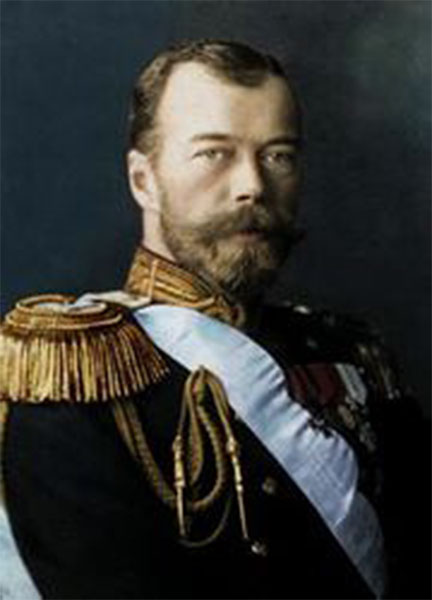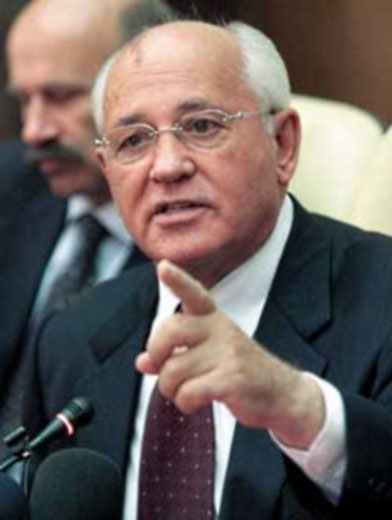
Decree No. 1
/ Главная / Russkiy Mir Foundation / Publications / Decree No. 1Decree No. 1

On March 15, 1917, the last Russian Emperor, Nicolas II, abdicated.
On March 15, 1990, the first and last president of USSR, Mikhail Gorbachev, was elected.
Apart from nationality, these two very different figures were united by another characteristic as well: Nicolas held a good deal of the blame for the collapse of one regime – the Russian Empire, while Mikhail Gorbachev was clearly at the helm during the final deterioration of another powerful regime – the Soviet Union.
In the first instance, the process of the self-destruction of the state took only a matter of months. The events of late-1916 and early-1917 progressed as if hours were entire years. And there is no need to rehash these events which led to the collapse of the country. We will focus only on one event taking place the day before the emperor abdicated, an event playing a key role in the fate of the Fatherland.
On March 14, 1917, the Petrograd Council of Worker and Soldier Deputies signed Decree No. 1 and issued it to the army. In a matter of weeks, like a time bomb, it exploded on the front of the First World War, although its authors sought to recall it. Newspapers in Petrograd explained that the decree related only to the troops stationed in capital. But it was too late. And the newspapers never made it to the front, as the decree had.
So what was this Decree No. 1 about? How did it impact not only the army but the entire Russian people?
The decree had a mere seven provisions. Several of them were secondary in nature. But the most import aspect entailed the abandonment of the unity of command. And this, in essence, completely undermined military discipline. Soldiers ceased to obey officers, who were stripped not only of the authority to command but also to bear arms.
Inebriated by the feverous events in the capital and irresponsible pronouncements of party emissaries, wary from trench warfare and firefights, the soldiers transformed into an uncontrollable crowd. Even worse, an armed crowded that had already grown accustomed to blood and death.
Regardless of what the Provisional Government in Petrograd and later the Bolsheviks after the October Revolution attempted to do to hold of the enemy until the allies in the West could defeat Germany, all was for naught. It took only one year for the entire power and force of the Russian Army to evaporate and the country be forced to beg the mercy of its enemy.
On March 3, 1918, the Brest Treaty was signed and on March 15 ratified.
Russia lost to the Axis powers the regions of Poland, Ukraine, Belarus, Baltic provinces, Finland and in the Caucasus. The country gave up its Black Sea fleet and promised to keep its Baltic fleet in Konshtadt and Petrograd. And the army was disbanded.
And in addition to this Russia was to pay 6 billion mark and 500 million gold rubles in reparations.
Germany immediately began to occupy Russian land and, for example, in the south, stopping only in Rostov.

To a certain degree the results of the separate Brest Treaty, which the Coviet Union abided by for only 9 months, are still being felt to this day. It was then that the Slavic peoples of Lesser Russia were first instilled with the idea of their own statehood, reinforced by 25 years of existence apart from Russia. Similar ideas were sewn in the Caucasus.
A member of the Petrograd Council, Iosif Gorldenberg, once admitted: “Decree No. 1 wasn’t a mistake, it was a necessity… We had to choose between the revolution and the army. And we didn’t hesitate…” A choice between seizing power and protecting the Motherland at times of war!
The Brest Treaty proved another point as well: the Soviets were eager for power but unwilling to carry on a war that might risk that power. And so once again the decision was made against the interests of the country. It turns out that they would have only have had to wait it out another nine months, and had Russia remained in the fight with France and Britain, the job could have been done even less time.
And soon the Third Reich arose in Germany…
Now a few words about the second instance.
Mikhail Gorbachev became the head of the communist party of the Soviet Union on March 11, 1985. By1991, state debt had reached $70 billion and GDP growth was at -11%. And a state that had arisen on such doubtful legal grounds found itself disappearing via similarly murky agreements reached by new leaders in the Belovezhskaya Pushcha.
Incidentally, Nicolas II and Mikhail Gorbachev are connected by yet another link. As of March 2, 2011, Gorbachev is not also a recipient of the Order of St, Andrew.
The difference here is that Nicolas II received this highest order thanks to his status as someone born a Grand Prince of the Russian Empire.
Mikhail Gorbachev was awarded the order by a decree of the Russian president with the following explanation: the order was awarded for his “great personal contribution to strengthening peace and friendship between peoples and fruitful public work over the course of many years.” Apparently it is not important that this award is by definition intended to be awarded “for exceptional service in support of the prosperity, greatness and glory of Russia.”
On the three of the highest orders awarded to Gorbachev by the state that existed between the Russian Empire and the Russian Federation, we find the profile of one and the same person who was involved in the issue of Decree No. 1 and the Brest Treaty and the party that Mikhail Gorbachev headed in 1985. But here everything seemed to fit both decree and status.
Mikhail Bykov
New publications

 Mikhail Kalatozov, a director who transformed the world of cinematography in many ways, was born 120 years ago. He was a Soviet film official and a propagandist. Above all, he was capable of producing movies that struck viewers with their power and poetic language.
Mikhail Kalatozov, a director who transformed the world of cinematography in many ways, was born 120 years ago. He was a Soviet film official and a propagandist. Above all, he was capable of producing movies that struck viewers with their power and poetic language.  Ukrainian authorities have launched a persecution campaign against the canonical Ukrainian Orthodox Church (UOC), the biggest one in the country's modern history. Over the past year, state sanctions were imposed on clergy representatives, searches were conducted in churches, clergymen were arrested, criminal cases were initiated, the activity of the UOC was banned in various regions of the country, and monasteries and churches were seized.
Ukrainian authorities have launched a persecution campaign against the canonical Ukrainian Orthodox Church (UOC), the biggest one in the country's modern history. Over the past year, state sanctions were imposed on clergy representatives, searches were conducted in churches, clergymen were arrested, criminal cases were initiated, the activity of the UOC was banned in various regions of the country, and monasteries and churches were seized.  When Nektary Kotlyaroff, a fourth-generation Russian Australian and founder of the Russian Orthodox Choir in Sydney, first visited Russia, the first person he spoke to was a cab driver at the airport. Having heard that Nektariy's ancestors left Russia more than 100 years ago, the driver was astonished, "How come you haven't forgotten the Russian language?" Nektary Kotlyaroff repeated his answer in an interview with the Russkiy Mir. His affinity to the Orthodox Church (many of his ancestors and relatives were priests) and the traditions of a large Russian family brought from Russia helped him to preserve the Russian language.
When Nektary Kotlyaroff, a fourth-generation Russian Australian and founder of the Russian Orthodox Choir in Sydney, first visited Russia, the first person he spoke to was a cab driver at the airport. Having heard that Nektariy's ancestors left Russia more than 100 years ago, the driver was astonished, "How come you haven't forgotten the Russian language?" Nektary Kotlyaroff repeated his answer in an interview with the Russkiy Mir. His affinity to the Orthodox Church (many of his ancestors and relatives were priests) and the traditions of a large Russian family brought from Russia helped him to preserve the Russian language.

 The leaders of the Friends of the Great Russia cultural association (Amici Della Grande Russia) in Italy believe that the Western policy of abolishing Russian culture in Europe has finally failed. Furthermore, it was doomed to failure from the beginning.
The leaders of the Friends of the Great Russia cultural association (Amici Della Grande Russia) in Italy believe that the Western policy of abolishing Russian culture in Europe has finally failed. Furthermore, it was doomed to failure from the beginning.  Name of Vladimir Nemirovich-Danchenko is inscribed in the history of Russian theater along with Konstantin Stanislavski, the other founding father of the Moscow Art Theater. Nevertheless, Mr. Nemirovich-Danchenko was a renowned writer, playwright, and theater teacher even before their famous meeting in the Slavic Bazaar restaurant. Furthermore, it was Mr. Nemirovich-Danchenko who came up with the idea of establishing a new "people's" theater believing that the theater could become a "department of public education."
Name of Vladimir Nemirovich-Danchenko is inscribed in the history of Russian theater along with Konstantin Stanislavski, the other founding father of the Moscow Art Theater. Nevertheless, Mr. Nemirovich-Danchenko was a renowned writer, playwright, and theater teacher even before their famous meeting in the Slavic Bazaar restaurant. Furthermore, it was Mr. Nemirovich-Danchenko who came up with the idea of establishing a new "people's" theater believing that the theater could become a "department of public education."  "Russia is a thing of which the intellect cannot conceive..." by Fyodor Tyutchev are famous among Russians at least. December marks the 220th anniversary of the poet's birth. Yet, he never considered poetry to be his life's mission and was preoccupied with matters of a global scale. Mr.Tyutchev fought his war focusing on relations between Russia and the West, the origins of mutual misunderstanding, and the origins of Russophobia. When you read his works today, it feels as though he saw things coming in a crystal ball...
"Russia is a thing of which the intellect cannot conceive..." by Fyodor Tyutchev are famous among Russians at least. December marks the 220th anniversary of the poet's birth. Yet, he never considered poetry to be his life's mission and was preoccupied with matters of a global scale. Mr.Tyutchev fought his war focusing on relations between Russia and the West, the origins of mutual misunderstanding, and the origins of Russophobia. When you read his works today, it feels as though he saw things coming in a crystal ball...